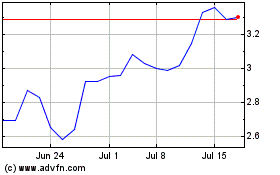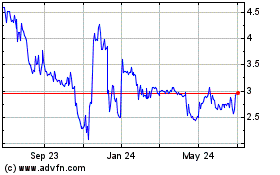Oncocyte Corporation (Nasdaq: OCX), a precision diagnostics
company with the mission to improve patient outcomes by providing
personalized insights that inform critical decisions throughout the
patient care journey, announced today new data from ongoing
clinical research evaluating the utility of DetermaIO™, the
Company’s proprietary test designed to determine the likelihood of
benefit of immune checkpoint inhibitors (ICIs), at the upcoming
American Society of Clinical Oncology Annual Meeting (ASCO), taking
place June 3-7, 2022 virtually and in-person in Chicago.
DetermaIO was launched via an Early Access
Program in Q4 of 2021 and is the first and only commercial test to
assess multiple components of the tumor immune microenvironment
(TIME), giving insight into the biology of the tumor that allows
for physicians and their patients to make informed decisions about
their treatment journey. The three posters to be presented by
Oncocyte add to the growing body of evidence showing that the test
identifies patients who respond to ICIs – including Keytruda®,
Opdivo®, Tecentriq® and Imfinzi® – in lung, bladder, kidney,
triple-negative breast, and now colon and gastric cancers,
suggesting a pan-cancer utility for the test in both primary and
metastatic settings.
- An immune-related gene
expression profile to predict the efficacy of adding atezolizumab
to first-line FOLFOXIRI plus bevacizumab in metastatic colorectal
cancer: A translational analysis of the phase II randomized
AtezoTRIBE study. [Abstract #3581], recipient of Marcia
Mataldi Endowed Merit Award from ASCO’s Conquer Cancer Foundation,
profiles the AtezoTRIBE study and highlights data supporting that
DetermaIO’s deep characterization of the TIME helps identify
patients with colon cancer likely to benefit from immunotherapy.
AtezoTRIBE previously demonstrated that the addition of Tecentriq
(atezolizumab), an ICI developed and marketed by Roche, benefited
some patients with metastatic colorectal cancer (mCRC), but that
the current biomarker, which identifies only about 5% of those with
colon cancer, misses a significant fraction of responders. For the
other 95% of patients, those with proficient mismatch repair (pMMR)
tumors, identifying a subgroup able to achieve benefit from ICIs is
crucial. Researchers assessed the role of DetermaIO to predict
clinical benefit from the addition of an ICI to first-line
chemotherapy in patients with mCRC, finding that 27% of patients in
this study were DetermaIO positive. Identification of these
patients had a significant association with progression free
survival (PFS) regardless of whether they were in the pMMR group or
not.“These results are exciting as they show DetermaIO may be
helpful to predict treatment benefit for patients in metastatic
colorectal cancer, including the patients with pMMR tumors.
Furthermore, they potentially show the value of tests that reflect
the broader tumor immune microenvironment in identifying mCRC
patients who are more likely to benefit from ICI-based
therapies,” said Chiara Cremolini, President of GONO Foundation and
Principal Investigator of the AtezoTRIBE trial.
- Association of 27-gene IO
score with outcome in a phase Ib trial of pembrolizumab (pembro)
plus chemotherapy (CT) in metastatic triple-negative breast cancer
(mTNBC) [Abstract #1082] builds on previously released
data showing DetermaIO predicts benefit of treatment with Tecentriq
over neoadjuvant chemotherapy alone in non-metastatic triple
negative breast cancer (TNBC). The data confirms that DetermaIO
also has the ability to predict benefit of treatment with Keytruda
(pembrolizumab) in mTNBC. Currently Keytruda is approved in this
setting for the 38% of patients who are PD-L1 positive. The study
evaluated clinical response to Keytruda plus chemotherapy in mTNBC
patients, showing DetermaIO was predictive of response regardless
of PD-L1 status. In addition, the test could identify PD-L1
negative tumors that respond to Keytruda plus chemotherapy,
addressing an unmet need for the 62% of patients who are currently
ineligible for treatment with an ICI in this indication. These new
data demonstrate DetermaIO’s utility in TNBC with two ICIs:
Tecentriq and Keytruda, the most commonly-prescribed ICI’s for this
indication.
- The 27-gene IO score is
associated with molecular features and response to immune
checkpoint inhibitors (ICI) in patients with gastric cancer
[Abstract #4058] suggests that DetermaIO may be a more
comprehensive biomarker for clinical decision making in gastric
cancer due to its unique properties of characterizing the TIME.
Data was obtained from three independent cohorts including The
Cancer Genome Atlas Program (TCGA), The Asian Cancer Research Group
(ACRG), and a clinical cohort with ICI response data. Importantly,
in the clinical cohort of 59 patients, DetermaIO was statistically
significantly associated with ICI response. The TCGA and ACRG
cohorts showed that DetermaIO was associated with a number of
biomarkers used to identify patients who are most likely to benefit
from ICI therapies, potentially implying that a single DetermaIO
test could replace the several tests that are currently run
concurrently on each patient sample. With gastric cancer being the
third-leading cause of cancer-related death worldwide, DetermaIO
may fill the unmet need for a biomarker that can better predict
response to ICI therapies.
“We are thrilled to present this group of data
at ASCO this year, which build on the seven previous studies that
support DetermaIO,” said Rob Seitz, Head of Immune Oncology at
Oncocyte. “The studies over the past two years have established a
solid foundation for DetermaIO’s use as a predictive test in four
major tumor types. The exciting data from the colon trial opens up
a fifth and extremely important indication given there is a very
large patient population in CRC that, today, has no option for life
saving ICI therapies. We are on schedule to deliver our CMS dossier
in the second half of 2022 and look forward to bringing this
important test to a full market launch.”
The ASCO 2022 virtual program and abstracts are
currently available online at the ASCO 2022 website.
In addition, Oncocyte is supporting a Continuing
Medical Education Event (CME) by way of an unrestricted educational
grant on Sunday, June 5, 2022, at 6:30PM CDT. The program, entitled
Convergence of Molecular Diagnostics and Tumor Microenvironment to
Improve Personalized Medicine in Breast, Lung, and Colorectal
Cancers, will be chaired by David Gandara, MD (UC Davis
Comprehensive Cancer Center). Charu Aggarwal, MD, MPH (Abramson
Cancer Center, University of Pennsylvania), Heinz-Josef Lenz, MD
(USC Norris Comprehensive Cancer Center), and Priyanka Sharma, MD
(University of Kansas Medical Center) will comprise the
faculty.
This 90-minute session, held adjunct to the 2022
ASCO Annual Meeting, will offer updates on the latest advances in
molecular diagnostic tools and biomarkers to help guide
personalized therapies and predict which patients will have the
best outcomes. Novel diagnostic tools have the potential to enhance
treatment decision-making, optimize immunotherapy selection, and
ultimately improve patient care.
Disclaimer: Not an official event of the 2022
ASCO Annual Meeting. Not sponsored, endorsed, or accredited by
ASCO®, CancerLinQ®, or Conquer Cancer® the ASCO Foundation.
About OncocyteOncocyte is
a precision diagnostics company with a mission to improve patient
outcomes by providing personalized insights that inform critical
decisions throughout the patient care journey.
The Company, through its proprietary tests and
pharmaceutical services business, aims to help save lives by
accelerating the diagnosis of cancer and advancing cancer care. The
Company’s tests are designed to help provide clarity and confidence
to physicians and their patients at every stage post-diagnosis
treatment. DetermaRx™ identifies early-stage lung cancer patients
who are at high risk for cancer recurrence and who may benefit from
adjuvant chemotherapy. DetermaIO™, a gene expression test currently
used as a research-use only tool, assesses the tumor
microenvironment to predict response to immunotherapies. The
Company’s pipeline of tests in development also includes
DetermaTx™, which will assess mutational status of a tumor,
blood-based test DetermaCNI™, which can monitor cancer patients for
recurrence of disease, long-term recurrence monitoring test
DetermaMx™, and blood-based solid organ transplantation monitoring
test TheraSure™. In addition, Oncocyte’s pharmaceutical services
provide companies that are developing new cancer treatments a full
suite of molecular testing services to support the drug development
process.
DetermaRx™, DetermaIO™, DetermaTx™, DetermaCNI™,
DetermaMx™ and TheraSure™ are trademarks of Oncocyte
Corporation.
Forward-Looking StatementsAny statements that
are not historical fact (including, but not limited to statements
that contain words such as “will,” “believes,” “plans,”
“anticipates,” “expects,” “estimates,” “may,” and similar
expressions) are forward-looking statements. These statements
include those pertaining to, among other things, the anticipated
delivery of a CMS dossier in the second half of 2022, the expected
full market launch of DetermaIO, and other statements about the
future expectations, beliefs, goals, plans, or prospects expressed
by management. Forward-looking statements involve risks and
uncertainties, including, without limitation, the potential impact
of COVID-19 on Oncocyte or its subsidiaries’ financial
and operational results, risks inherent in the development and/or
commercialization of diagnostic tests or products, uncertainty in
the results of clinical trials or regulatory approvals, the
capacity of Oncocyte’s third-party supplied blood sample analytic
system to provide consistent and precise analytic results on a
commercial scale, potential interruptions to supply chains, the
need and ability to obtain future capital, maintenance of
intellectual property rights in all applicable jurisdictions,
obligations to third parties with respect to licensed or acquired
technology and products, the need to obtain third party
reimbursement for patients’ use of any diagnostic
tests Oncocyte or its subsidiaries commercialize in
applicable jurisdictions, and risks inherent in strategic
transactions such as the potential failure to realize anticipated
benefits, legal, regulatory or political changes in the applicable
jurisdictions, accounting and quality controls, potential greater
than estimated allocations of resources to develop and
commercialize technologies, or potential failure to maintain any
laboratory accreditation or certification. Actual results may
differ materially from the results anticipated in these
forward-looking statements and accordingly such statements should
be evaluated together with the many uncertainties that affect the
business of Oncocyte, particularly those mentioned in the
“Risk Factors” and other cautionary statements found in
Oncocyte’s Securities and Exchange Commission (SEC)
filings, which are available from the SEC’s website. You are
cautioned not to place undue reliance on forward-looking
statements, which speak only as of the date on which they were
made. Oncocyte undertakes no obligation to update such
statements to reflect events that occur or circumstances that exist
after the date on which they were made, except as required by
law.
Investor ContactCaroline CornerICR Westwicke
Tel: 415.202.5678caroline.corner@westwicke.com
Media ContactMegan KernanICR Westwicke
Healthcare
PRTel: 646.677.1870megan.kernan@westwicke.com
Oncocyte (NASDAQ:OCX)
Historical Stock Chart
From Mar 2024 to Apr 2024

Oncocyte (NASDAQ:OCX)
Historical Stock Chart
From Apr 2023 to Apr 2024
